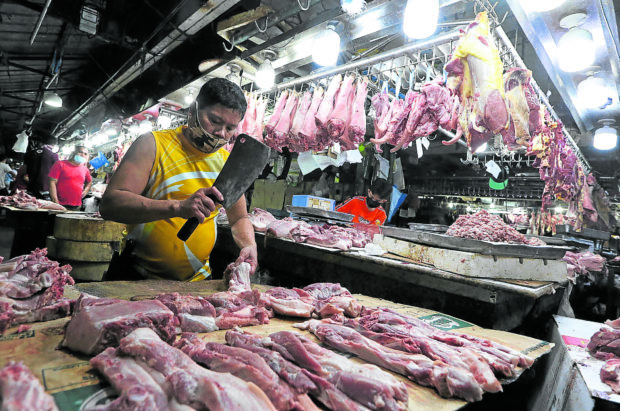Duterte sets price cap on pork, chicken

CHOICE CUTS Meat vendors at Commonwealth Market in Quezon City prepare choice cuts of pork as they wait for shoppers on Monday. The government has ordered a price freeze on pork and chicken in the next two months as consumers complain of the high cost of food. —NIÑO JESUS ORBETA
MANILA, Philippines — President Duterte has imposed a 60-day freeze in the prices of pork and chicken in Metro Manila to check their exorbitant prices in markets, earning the ire of local producers who believe the rates are “impossible” to meet.
Executive Order No. 124, which the President signed on Monday, set price ceilings of P270 a kilo for “kasim/pigue” and P300 per kilo for “liempo,” and P160 a kilo for dressed chicken, against the current rates of P440 and P200, respectively, in public markets.
The President acted on a recommendation of Agriculture Secretary William Dar, who blamed unscrupulous traders and profiteers for the abnormal price increases. Local raisers, however, have cited a combination of factors, such as the slow recovery of food establishments from the effects of the coronavirus pandemic, the unimpeded importation of meat, and the persistence of the African swine fever (ASF).
Consumers have been complaining of higher food prices not only of meat but also of vegetables and some fish.
The inflated rates have especially hurt low-income families who are still reeling from the economic standstill caused by the pandemic.
Article continues after this advertisementSenate hearing
Industry leaders claimed during a hearing called by the Senate committee on agriculture and food that they were not consulted by the Department of Agriculture (DA) when it recommended price ceilings to the President.
Article continues after this advertisementThe DA earlier said in a briefing that the proposed rates were based on prevailing market prices in previous months. But critics said it did not factor in changes in production costs.
Alyansa Agrikultura chair Ernesto Ordoñez, who was present during the hearing, said in an interview that the price freeze would demotivate hog and chicken raisers from further production and would hurt the industry in the long run.
“We will not be earning anymore with those price points,” said Gregorio San Diego, chair of the United Broilers Raisers Association. “There are fewer poultry raisers now since hotels and restaurants were temporarily closed during the lockdowns that resulted in an oversupply. Even then, the DA has allowed the importation of chicken despite our plea to temporarily suspend it.”
Restaurants
Before the pandemic, about 30 percent of the local poultry supply was intended for the restaurant industry. This has resulted in record-low farm prices that discouraged raisers from reinvesting.
San Diego said chicken prices had eventually skyrocketed to a record-high of P50 apiece from P20 apiece since then. For poultry raisers, traders and resellers to earn, the price ceiling must range from P170 to P190 a kilo.
AGAP Rep. Nicanor Briones, who is also the vice president of the Pork Producers Federation of the Philippines, said hog raisers similarly could not meet the price ceiling. Retail rates may be nailed at P330 to P360 a kilo at best, he added.
He countered Dar’s claim that some raisers are hoarding supplies to manipulate the prices.
“We are not hiding our supply. Rather, we are rushing to bring our pork into the market for fear of ASF. Hoarding on the part of hog producers is impossible,” Briones said.
The disease has led to the deaths of more than 4 million hogs in the country since the first case was reported in September 2019. It has devastated most farms in Luzon that supply pork to Manila.
Transport subsidy
To help concerned parties meet the price ceilings, the DA committed to subsidize transport costs (P30 per kilo), although limited to producers in the Visayas and Mindanao who will supply Luzon.
Groups said that unless the government poured money into the measure, it would not be enough.
The Samahang Industriya ng Agrikultura called the agriculture secretary “architect of the executive order” and would hold him responsible for ensuring the delivery of adequate pork and chicken products in the metropolis, according to its chair, Rosendo So.
Sen. Francis Pangilinan, a known agriculture advocate, questioned the effectiveness of EO 124 as a means to tame prices. He noted that a price freeze was also imposed by Mr. Duterte in November after a series of typhoons destroyed rice, corn and vegetable farms.
Prices, however, still increased during the period, and no one had been penalized for profiteering or hoarding, Agriculture Undersecretary Kristine Evangelista said.
Ramon Clarete, dean of the University of the Philippines School of Economics, also opposed the directive.
“Telling hog producers to sell scarce pork at below market value kicks them out of the pork business instead, and blows away our prospects of quickly normalizing production,” he said. INQ